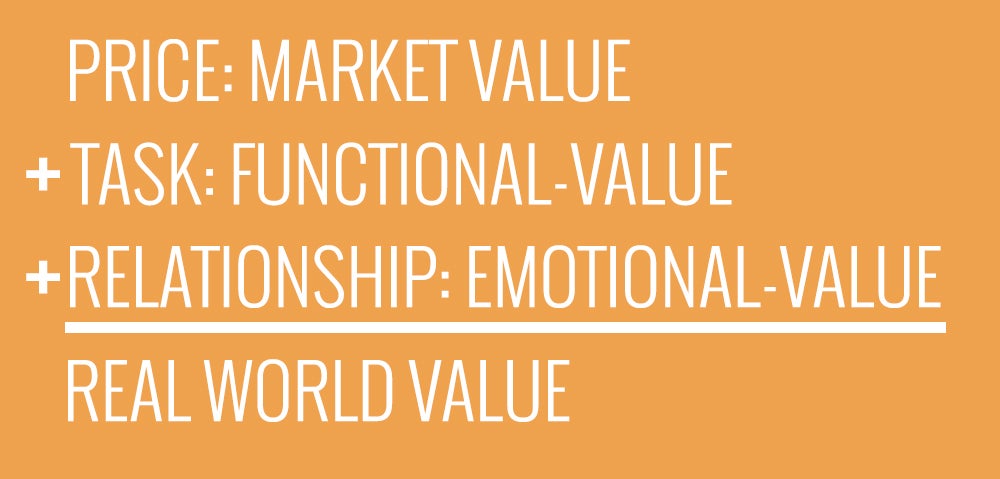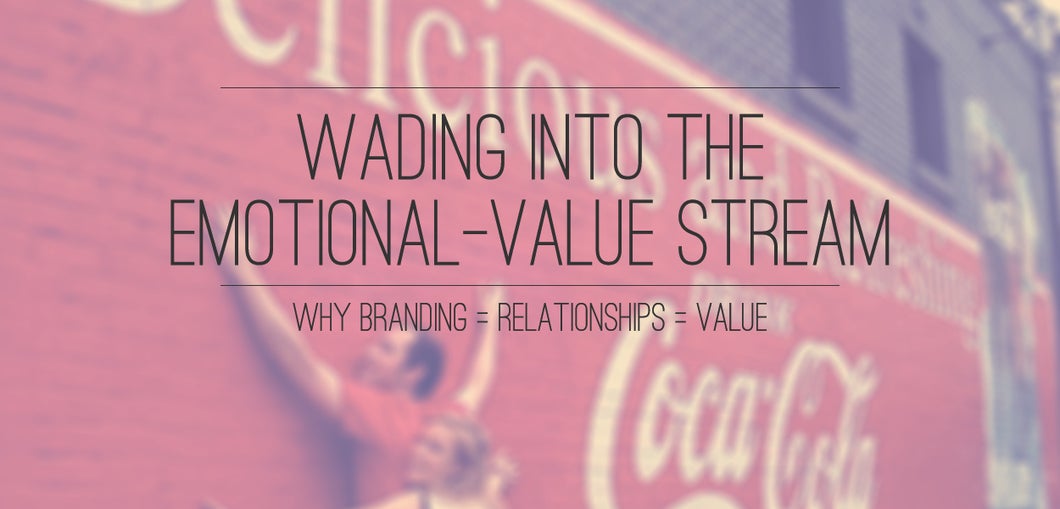Understanding value is imperative to creating a successful startup.
If you fail to discover the value that you bring for real people, you’ll never get off the starting blocks. This is true whether you are B2B, B2C, B2B2C or any other combination of B and the number 2. This is true whether you offer a physical product, a fancy new app, a service or even just an opinion column in a blog.
Value is everything.
To discover your value, you have to wade into the value stream. As Brant Cooper and Patrick Vlaskovits put it so well in their book, The Lean Entrepreneur,
“That is why we say that no matter what your startup endeavor is, your job is to discover the value, for whom it’s being created, and whether there’s a large enough market to support the business you envision.”
Discovering value starts by understanding the concept of value. Value is best explained by breaking it down into three independent and highly interconnected value streams: the market-value stream, the functional-value stream and the emotional-value stream.
A VALUE OVERVIEW
The market-value stream describes the fluctuating price in the marketplace determined by supply and demand. Prices ebb and flow with changes in availability and the cost of developing the goods. Market-value is about price.
The functional-value stream describes the problem / pain your potential customers will hire your product or service to solve for them. Products are purchased to alleviate our pains. When a product is introduced that solves the problem better, that product will typically win out. Functional-value is about task.
The emotional-value stream describes the relational bias or preference we have for one product over another, and, more importantly, one company over another. People form sets of expectations and partiality about purchasing from one company over another based on the emotional association and relationship they have with them. Emotional-value is about relationship.

AVOIDING VALUE TUNNEL-VISION
Collectively, the three value streams represent how products achieve value for real people. In fact, in the real world, value is truly a non-formulaic combination of all three. Price, function and relationship are all part of people’s conscious and subconscious decisions about why we buy what we buy.
Yet, too often entrepreneurs become obsessive over only a single value. Can you guess which one? If you guessed function, you guessed right. Entrepreneurs seem to get trapped in defining their value as entirely functional. This makes sense as the root of most entrepreneurial journeys starts by observing a problem that you think you can solve.
I’ve had countless conversations with entrepreneurs explaining the uniqueness of their product or idea. Almost all of them, when describing why their idea has worth, talk about the function that their product brings to the market and the way that it makes a task better, quicker, more efficient, more fun, etc.
Thinking only about your functional-value forms value tunnel-vision that sells you short of realizing the full potential your startup can have.
Breaking the value tunnel-vision pitfall requires expanding both your definition and development of your value to include emotional-value. And emotional-value requires branding.
BRANDING IS EMOTIONAL-VALUE
Branding is about authentic, consistent and intentional relationship building. People create allegiances and loyalty to brands. People care deeply about which brand they buy and what that says about them. People care about the difference between Coke and Pepsi, Apple and PC, Wal-mart and Target. Why? Because we care about the relationship we have with them.
Branding, by definition, is the emotional-value stream. Branding = relationships, and relationships are extremely valuable.
Take sugar for example. Sugar is by definition a commodity with market-value. It has full fungibility; that is, the market treats its instances as equivalent with no regard for who produced them. Sugar also has functional-value. It adds sweetness and flavor to our foods and can produce a spike in our blood sugar that causes a rush of energy (just ask any 4-year-old with a bottle of Coke). I think for most of high school I enjoyed the functional-value of sugar.
Both the market-value and functional-value of sugar are well-defined and knowable, but sugar, by itself, has no real emotional-value. Branding defined the emotional-value of sugar. That’s why, even though the FDA requires the same standards of production, ingredients and storage for generic versions of sugar, people are willing to pay almost double for the labeled sugar because of the emotional-value they have with the brand.
This is true for most pantry items as well including flour, salt and spices. Branding almost doubles the price for identical products. Developing brand has proved to be worth it for sugar, and it’s probably worth it for you as well.
FOCUS ON EMOTIONAL-VALUE…TOO.
There is no doubt that all three value streams are important. They are interconnected and together form the basis for real world value. If you’ve developed value tunnel-vision, you’ve limited the possibilities that emotional-value and branding offer.
People are fallible. Their emotional needs fluctuate and evolve. Building something that has emotional relevancy and then maintaining that relationship with your customers is a difficult task. That’s why creating emotional-value is something that you have to plan for, work at and constantly experiment with. But the payoff can be immeasurable.
As entrepreneurs, creating emotional-value should be a focus from the start. In other words, branding should be a focus from the start.

